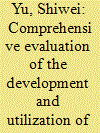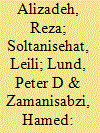|
|
|
Sort Order |
|
|
|
Items / Page
|
|
|
|
|
|
|
| Srl | Item |
| 1 |
ID:
166296


|
|
|
|
|
| Summary/Abstract |
This study proposes comprehensive evaluation criteria, involving aspects of energy, economy, environment, technology, and society (E3TS), for the development and utilization of renewable energy (RE). The criteria consist of 22 indicators. The comprehensive performance, from 2011 to 2015, of 30 provincial regions in China with respect to renewable energy development and utilization (REDU) was evaluated on the basis of the E3TS criteria, using an analytic network process (ANP). The results show that the total comprehensive performance (2011–2015) of all the 30 provincial regions of China improved in general. There was a marked improvement in technology performance. Qinghai, Yunnan, and Sichuan ranked the top three in comprehensive performance of REDU, while the comprehensive performance of Shaanxi, Hainan, and Henan were the lowest. During the study period, while the comprehensive performance of most provincial regions such as Ningxia and Xinjiang increased, that of five provincial regions, including Tianjin and Hainan, decreased. The regional comprehensive performance was severely affected by the installed capacity and power generation of RE.
|
|
|
|
|
|
|
|
|
|
|
|
|
|
|
|
| 2 |
ID:
171394


|
|
|
|
|
| Summary/Abstract |
Shifting from fossil to clean energy sources is a major global challenge, but in particular for those countries with substantial fossil-fuel reserves and economies depending on fossil-fuel exports. Here we introduce an improved framework for renewable energy planning and decision-making to help such countries to more effectively harness their abundant renewable energy resources. We use Iran as a case for the analysis. The framework includes identifying and removing barriers that prevent the use of renewables. It is based on combining two models: Benefit, Opportunity, Cost, Risk (BOCR) and Analytic Network Process (ANP) models. In the analyses, the mutual weight of strategic criteria is employed such as technology, economy, energy vulnerability, security, global effects, and human wellbeing. Using the integrated model, we find that solar energy would be the preferential renewable energy source for Iran. Also, the role of infrastructures, policies, and administrative structures in renewable energy to facilitate their development was analyzed. The renewable energy policy-making framework presented is applicable to other countries as well.
|
|
|
|
|
|
|
|
|
|
|
|
|
|
|
|
| 3 |
ID:
128343


|
|
|
|
|
| Publication |
2014.
|
| Summary/Abstract |
This paper presents the findings of a study on decision making models for the analysis of capital-risk investors' preferences on biomass power plants projects. The aim of the work is to improve the support tools for policy makers in the field of renewable energy development.
Analytic Network Process (ANP) helps to better understand capital-risk investors preferences towards different kinds of biomass fueled power plants. The results of the research allow public administration to better foresee the investors' reaction to the incentive system, or to modify the incentive system to better drive investors' decisions.
Changing the incentive system is seen as major risk by investors. Therefore, public administration must design better and longer-term incentive systems, forecasting market reactions. For that, two scenarios have been designed, one showing a typical decision making process and another proposing an improved decision making scenario.
A case study conducted in Italy has revealed that ANP allows understanding how capital-risk investors interpret the situation and make decisions when investing on biomass power plants; the differences between the interests of public administrations's and promoters', how decision making could be influenced by adding new decision criteria, and which case would be ranked best according to the decision models.
|
|
|
|
|
|
|
|
|
|
|
|
|
|
|
|
|
|
|
|
|